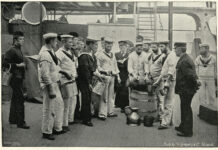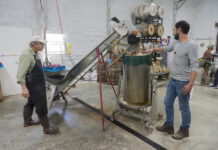One of the greatest consumer shifts in America over the last thirty years has been back toward buying from local producers, away from larger corporations. We like to know who grew our food, distilled our spirits and brewed our beer. We have begun to actively care about and research how companies operate, take care of their employees, make their products and steward the environment.
In fact, the attraction consumers feel to local, small business may be the only thing Republicans, Democrats and Independents have agreed on in America lately. According to the Pew Research Center, more than 80% of Americans believe that smaller, local businesses have had a positive impact on their lives, as compared to 27% who said large companies have. Seventy-two percent of Republicans, 70% of Democrats and 73% of Independents say smaller, local businesses have a very positive effect on the U.S. economy.
As we have returned to consuming more locally, we have had the luxury of meeting owners, visiting production facilities and observing in person how the products we buy are made. This is nowhere more true than in the alcoholic beverage industry with the boom of craft distilling, brewing and wine making.
Yet all the things we need are not made locally, so we look beyond our communities for much of what we consume. The marketplace quickly becomes confusing as we try to gain trust in producers we can’t visit, believe in advertising from people we don’t know and learn the stories of makers we can’t meet. Choosing products gets even harder when we hear national news stories of companies being sued or fined for violations of law, health codes, policy and conduct.
In the same recent decades, our distrust of advertising has grown. One of every four readers of print and social media advertisements do not believe that they are being told the truth in advertisements. Many companies have made claims about how deeply they care about people and the environment while their actions on a greater scale tell a much different story. Consumers can be devastated to learn the truth about producers they have come to love and respect.
These conditions have given rise to the B Corp, a rigorous certification program created by B Lab.
B Lab measures a company’s positive impact on more than the financial bottom line. They assess the impact of a company’s actions on workers, community, customers and the environment. Companies that achieve the coveted B-Corp certification have participated in a demanding assessment and recertification every two years, requiring deep documentation of daily actions and practices. They have integrated their socially and environmentally focused business practices into company policy, legal documents and operating DNA. Consumers can trust that they are doing as they say because the third-party B Lab has confirmed it.
In 2011, there were 400 certified B-Corp companies worldwide, and in 2018, there are 2,600, a nearly sevenfold increase. At the time of this article’s publication, there were only three B-Corp certified distilleries: Montanya Distillers in Crested Butte, CO, Headframe Spirits in Butte, MT, and Fair Game Beverage Company in Pittsboro, NC. There were 16 certified breweries and 14 wineries.
Why Would a Distillery Seek B-Corp Certification?
If your company is engaged in daily practices that meet high standards of social and environmental performance and you seek to offer public transparency and legal accountability to balance profits with this purpose, the B-Corp certification can be an important asset. Being a B Corp provides consumers with verification and assurance that your claims are true. More and more consumers are beginning to search the B-Corp directory when considering which products to buy or which services to hire, because the certification removes the burden of independent evaluation.
The B-Corp certification is an ideal way to let your targeted customers know that you care as much about social and environmental stewardship as they do, and that your commitments are not just lip service. Displaying the B-Corp certification seal can help with marketing and outreach to your customer base.
If your management wants to assure that social and environmental commitments at your distillery are not just skin-deep today but are locked deeply into the governing documents of the company for the long term, B Corp is a great mechanism to accomplish this.
The B Lab is also a very supportive business network of owners and operators who share a deep ethos of sustainability. They gather together, mentor, mutually refer and celebrate each other, which can create a shared environment in which to learn, inspire, be inspired and operate with other professionals. It can also establish a connection to a network of like-minded consumers.
The B-Corp assessment is a way for distilleries who want to grow toward using business as a force for good to understand what this looks like. Not every founder knows instinctively what policies to implement and actions to take. The B-Corp assessment provides a useful framework.
And for those companies who are already doing so much good, the certification is validation and confirmation of their actions, which alone can be worth the effort.
Visit www.bcorporation.net to learn more and see if B-Corp certification could be valuable to your craft distillery.








